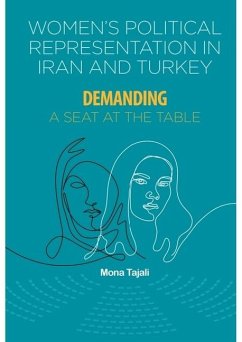
Regime Change in Contemporary Turkey
Politics, Rights, Mimesis
Versandkostenfrei!
Versandfertig in über 4 Wochen
137,99 €
inkl. MwSt.
Weitere Ausgaben:

PAYBACK Punkte
69 °P sammeln!
Explores the transformation of Turkey's political regime from 2002 Turkey has undergone a series of upheavals in its political regime from the mid-19th century. This book details the most recent change, locating it in its broader historical setting. Beginning with the Justice and Development Party's rule from late 2002, supported by a broad informal coalition that included liberals, the book shows how the former Islamists gradually acquired full power between 2007 and 2011. It then describes the subsequent phase, looking at politics and rights under the amorphous new order. This is the first s...
Explores the transformation of Turkey's political regime from 2002 Turkey has undergone a series of upheavals in its political regime from the mid-19th century. This book details the most recent change, locating it in its broader historical setting. Beginning with the Justice and Development Party's rule from late 2002, supported by a broad informal coalition that included liberals, the book shows how the former Islamists gradually acquired full power between 2007 and 2011. It then describes the subsequent phase, looking at politics and rights under the amorphous new order. This is the first scholarly yet accessible assessment of this historic change, placing it in the larger context of political modernisation in the country over the past 150 or so years. Key Features * Covers the main issues in contemporary Turkish politics: the effective concentration of powers in the government; rule by policy rather than law; the religious and secular divide; the state of the media; basic freedoms; minority rights; the marginalised in society; economic growth at the cost of dire public dispossession * Places Turkey in the broader milieu of the Arab Spring, especially in terms of Islamist politics and Muslim piety in the public sphere, with some emphasis on 'Islamo-nationalism' as a local Islamist variety * Uses the concept of mimesis to show that continuity is a key element in Turkish politics, despite the series of radical breaks that have occurred * Effortlessly blends history, politics, law, social theory and philosophy in making sense of the change













